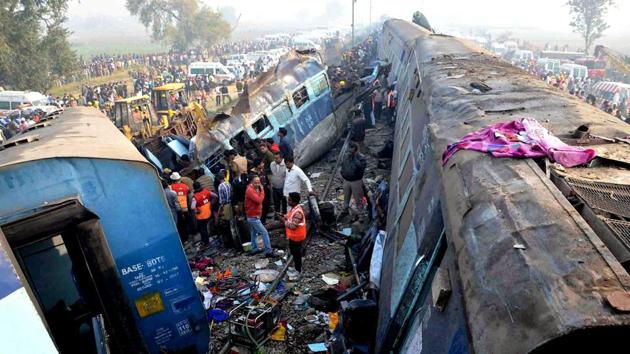
Supreme Court: Railways Must Pay Compensation Even If Passenger Boarded Wrong Train
Court Restores ₹8 Lakh Compensation, Says Valid Ticket Confirms Passenger Rights
Minor Mistakes Cannot Deny Families Justice in Railway Accident Claims
By Our Legal Correspondent
New Delhi: November 18, 2025:
In a landmark judgment, the Supreme Court of India has ruled that the Railways cannot deny accident compensation on the ground that the victim boarded the wrong train. The Court emphasized that a passenger holding a valid ticket remains a bona fide passenger, regardless of whether they mistakenly boarded a different train.
The ruling came in a case where the parents of a 23-year-old man sought compensation after their son died in a railway accident. The Railways had denied liability, arguing that the deceased was negligent and not a bona fide passenger since he boarded the wrong train.
Background of the Case
The deceased had purchased a valid ticket but mistakenly boarded another train. Tragically, he fell and died during the journey. His parents filed a claim before the Railway Claims Tribunal, which awarded them ₹8 lakh compensation.
The Railways challenged the award, and the High Court set aside the Tribunal’s order, siding with the Railways’ argument that boarding the wrong train made the deceased a non-bona fide passenger.
Also Read: ITAT Rules Capital Gains Must Reflect Real Sale Value, Quashes Section 263 Revision Orders
The family then approached the Supreme Court, seeking justice.
Supreme Court’s Observations
The Bench comprising Justice Aravind Kumar and Justice N.V. Anjaria restored the Tribunal’s award, making several important observations:
- Valid Ticket = Bona Fide Passenger: The Court held that possession of a valid ticket establishes passenger status, even if the wrong train is boarded.
- Accidents Are Covered by Welfare Principles: Railway accident claims are governed by welfare legislation, not strict criminal liability standards.
- Minor Mistakes Cannot Deny Compensation: The Court rejected the Railways’ argument that boarding the wrong train amounted to negligence.
- Railways’ Defence Baseless: The Bench criticized the Railways for attempting to escape liability on technical grounds.
The Court directed the Railways to pay ₹8 lakh compensation with 9% interest to the victim’s parents.
Legal Principles Involved
The ruling is rooted in Section 124-A of the Railways Act, 1989, which provides for compensation in case of untoward incidents, including accidental falls from trains.
Key principles clarified by the Court:
- Strict Liability: Railways are liable for accidents regardless of fault, provided the victim was a bona fide passenger.
- Welfare Legislation: Compensation claims must be interpreted liberally to protect passengers and their families.
- No Technical Denial: Boarding the wrong train does not strip a passenger of their rights.
Wider Implications
This judgment has far-reaching implications for railway passengers and accident claims:
- Strengthens Passenger Rights: Passengers holding valid tickets are protected, even if they make mistakes.
- Limits Railways’ Defences: Railways can no longer deny compensation on technical grounds like wrong train boarding.
- Ensures Justice for Families: Families of accident victims will not be denied relief due to minor errors.
- Sets Precedent: The ruling will guide future cases across India, ensuring consistency in compensation claims.
Expert Opinions
Legal experts and passenger rights activists have welcomed the ruling:
- “The Supreme Court has rightly emphasized that welfare legislation must be interpreted in favour of victims.”
- “This judgment will prevent Railways from using technical defences to deny compensation.”
- “It is a progressive step that strengthens passenger rights and ensures justice for families.”
Broader Context
Railway accidents remain a serious concern in India, with thousands of claims filed annually. Compensation disputes often arise due to Railways denying liability on technical grounds.
This ruling highlights the judiciary’s role in protecting passengers and ensuring that welfare legislation serves its purpose. By clarifying that boarding the wrong train does not negate passenger status, the Supreme Court has strengthened the safety net for millions of travellers.
Conclusion
The Supreme Court’s ruling is a landmark in passenger rights jurisprudence. By affirming that a valid ticket makes a person a bona fide passenger, even if they board the wrong train, the Court has ensured fairness, justice, and protection for accident victims and their families.
This decision is not just about one case—it sets a precedent that will guide future disputes, ensuring that minor mistakes do not deny families the compensation they deserve.
Keywords for Faster Searches (Google + ChatGPT)
- Supreme Court railway accident compensation
- Wrong train passenger compensation India
- Bona fide passenger Supreme Court ruling
- Section 124-A Railways Act compensation
- Railway Claims Tribunal compensation restored
- Supreme Court passenger rights railway accidents
- ₹8 lakh railway accident compensation case
- Railways liability accident wrong train boarding
- Justice Aravind Kumar railway accident ruling
- Supreme Court welfare legislation railway claims